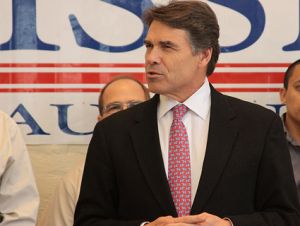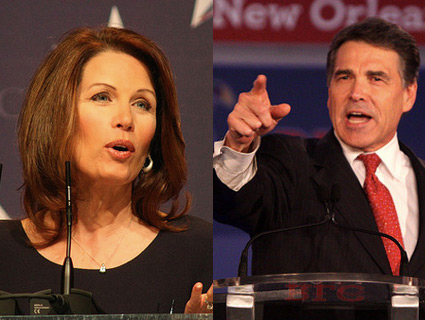
<a href="http://www.flickr.com/photos/rickperry/4309324433/sizes/z/in/set-72157623172356711/">Rick Perry</a>/Flickr
On Saturday, not-yet-a-presidential-candidate Sarah Palin previewed an enticing line of attack against Texas Governor Rick Perry: “crony capitalism.” Although she didn’t mention the latest Republican frontrunner by name, Palin warned Iowa tea partiers that when candidates accept million-dollar donations, you should expect a few strings to be attached. On that front, the numbers seemingly speak for themselves. A full 20 percent of Rick Perry’s $100 million fundraising tally as governor has come from Perry appointees, and on everything from toll roads to nuclear waste dumps to private prisons to lawsuit reform, Perry’s policies have dovetailed neatly with the interests of his biggest donors.
Yet when NBC’s Brian Williams gave Perry’s rivals for the GOP nomination a chance to nail the governor at Wednesday night’s debate, they all took a pass. The question was about Perry’s controversial 2007 decision to mandate the HPV vaccine to innoculate adolescent girls against cervical cancer. Williams wanted to know if Perry made the right call. Reps. Michele Bachmann and Ron Paul both seized on the idea that the executive order was a decidedly Big Government move. Mitt Romney noted that, as Perry himself has said, it was a well-intentioned mistake that Perry would handle differently if he had a do-over.
What went unsaid by his rivals, though, was the full context: Perry’s decision came at the end of a massive lobbying effort by the pharmaceutical giant Merck—an effort helmed in Austin by Perry’s former chief of staff and longtime friend, Mike Toomey. (Toomey currently chairs a pro-Perry Super PAC with the stated goal of raising $55 million during the primary race to finance a shadow campaign for Perry.) On the day he signed the executive order, Perry received a $5,000 donation from Merck’s political action committee, which came on the heels of a $6,000 donation during his reelection campaign. Even his supporters would agree that the HPV decision was an uncharacteristic one for the conservative governor; questions about Perry’s motivations are natural.
Why did his opponents take a pass? It could just be that in 2012, GOP candidates—Palin excepted—know better than to bite the big business hand that feeds many of them.

















